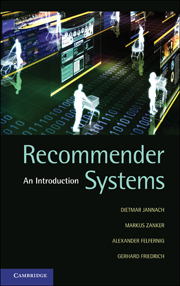Book contents
- Frontmatter
- Contents
- Foreword
- Preface
- 1 Introduction
- PART I INTRODUCTION TO BASIC CONCEPTS
- 2 Collaborative recommendation
- 3 Content-based recommendation
- 4 Knowledge-based recommendation
- 5 Hybrid recommendation approaches
- 6 Explanations in recommender systems
- 7 Evaluating recommender systems
- 8 Case study: Personalized game recommendations on the mobile Internet
- PART II RECENT DEVELOPMENTS
- Bibliography
- Index
5 - Hybrid recommendation approaches
from PART I - INTRODUCTION TO BASIC CONCEPTS
Published online by Cambridge University Press: 05 August 2012
- Frontmatter
- Contents
- Foreword
- Preface
- 1 Introduction
- PART I INTRODUCTION TO BASIC CONCEPTS
- 2 Collaborative recommendation
- 3 Content-based recommendation
- 4 Knowledge-based recommendation
- 5 Hybrid recommendation approaches
- 6 Explanations in recommender systems
- 7 Evaluating recommender systems
- 8 Case study: Personalized game recommendations on the mobile Internet
- PART II RECENT DEVELOPMENTS
- Bibliography
- Index
Summary
The three most prominent recommendation approaches discussed in the previous chapters exploit different sources of information and follow different paradigms to make recommendations. Although they produce results that are considered to be personalized based on the assumed interests of their recipients, they perform with varying degrees of success in different application domains. Collaborative filtering exploits a specific type of information (i.e., item ratings) from a user model together with community data to derive recommendations, whereas content-based approaches rely on product features and textual descriptions. Knowledge-based algorithms, on the other hand, reason on explicit knowledge models from the domain. Each of these basic approaches has its pros and cons – for instance, the ability to handle data sparsity and cold-start problems or considerable ramp-up efforts for knowledge acquisition and engineering. These have been discussed in the previous chapters. Figure 5.1 sketches a recommendation system as a black box that transforms input data into a ranked list of items as output. User models and contextual information, community and product data, and knowledge models constitute the potential types of recommendation input. However, none of the basic approaches is able to fully exploit all of these. Consequently, building hybrid systems that combine the strengths of different algorithms and models to overcome some of the aforementioned shortcomings and problems has become the target of recent research. From a linguistic point of view, the term hybrid derives from the Latin noun hybrida (of mixed origin) and denotes an object made by combining two different elements.
- Type
- Chapter
- Information
- Recommender SystemsAn Introduction, pp. 124 - 142Publisher: Cambridge University PressPrint publication year: 2010
- 3
- Cited by



